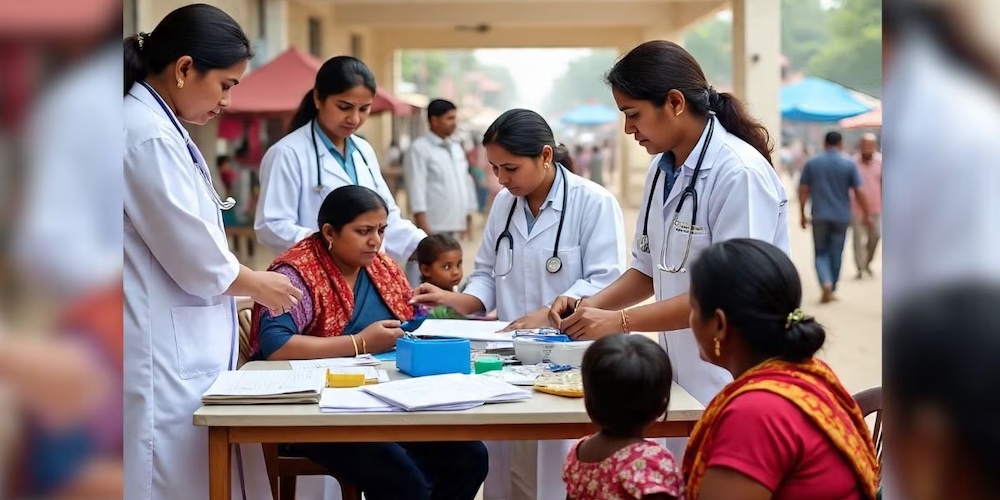Towards a Healthier India

Swasth Nari Sashakt Parivar Abhiyaan to Empower Women and Families
On September 17, 2025 that marked the 75th birthday of Prime Minister Narandra Modi, more than one lakh health camps were held for women and children all over the country, making it the largest ever health outreach.
These camps were organised at Ayushman Arogya Mandirs, Community Health Centres, and other healthcare facilities and actively promoted the idea of nutrition, health awareness, and overall family well-being.
This exercise is a part of the Swasth Nari Sashakt Parivar Abhiyaan (SNSPA), a landmark initiative by the Ministry of Health and Family Welfare (MoHFW) and the Ministry of Women and Child Development (MoWCD), aimed at strengthening healthcare services for women and children across India, with a focus on improving access, quality care, and awareness.
Described as a Jan Bhagidaari Abhiyaan, it encourages active participation from private hospitals and healthcare professionals to foster inclusive healthcare delivery.
This Abhiyaan supports the government’s broader goal of building healthier families and aligns with national priorities for inclusive development, leveraging platforms such as the Anganwadis to amplify outreach and sustainability in maternal and child health programs.
The comprehensive SNSPA, initiated by Prime Minister Narendra Modi, will run till Gandhi Jayanti on October 2, 2025.
It builds on the legacy of transformative government programs like Swachh Bharat Abhiyaan, leveraging the momentum of nationwide health and sanitation drives to address critical gaps in maternal and child health, as identified in prior national health surveys.
The Swasth Nari Sashakt Parivar Abhiyaan is strategically aligned with existing government schemes such as Mission Shakti, which focuses on women’s safety and empowerment, and Poshan 2.0, aimed at combating malnutrition among women and children.
The Swasth Nari Sashakt Parivar Abhiyaan prioritises women’s health by providing comprehensive health screenings and services tailored to their needs. Through health camps and other related initiatives, the campaign offers screenings for conditions like dermatological concerns, hypertension, anaemia, reproductive health issues, breast and cervical cancer, diabetes, tuberculosis (TB), and sickle cell disease (SCD), with specialised counselling in tribal areas.
These services, supported by the Ministry of Health and Family Welfare, aim to address gaps identified in national health surveys, ensuring early detection and treatment to improve women’s health across urban and rural areas.
The initiative involves specialists like gynaecologists, surgeons, and dentists, supported by district hospitals, to ensure accurate diagnosis and follow-up care, addressing health disparities identified in women and children.
SNSPA focuses on maternal and child care to strengthen family well-being, integrating with initiatives like Poshan 2.0. The campaign strengthens maternal and child health by providing antenatal care (ANC) check-ups, counselling, and distribution of Mother and Child Protection (MCP) cards to monitor health progress.

Immunisation services for pregnant women and children are a key focus, conducted through Anganwadis and health centres in alignment with Poshan 2.0.
With a focus on preventive care and nutrition awareness, SNSPA aims to reduce maternal and child mortality rate. It thus contributes to the larger goal of building resilient families aligned with the Prime Minister’s Viksit Bharat 2047 vision.
The Abhiyaan drives behavioural change by educating communities on essential health issues such as menstrual hygiene, balanced nutrition, and overall wellness. Through workshops and awareness programs at Anganwadis during Poshan Maah, the Swasth Nari Sashakt Parivar Abhiyaan (SNSPA) empowers women with the knowledge to make informed health choices. Facilitated by healthcare workers and community leaders, this education aims to break taboos, promote hygiene practices, and encourage sustainable health behaviours among women and their families.
Additionally, the campaign promotes Nikshay Mitra enrolment to support overall aim of the mission, fostering community involvement in national health goals and ensuring sustainable health practices.
Swasth Nari Sashakt Parivar Abhiyaan (SNSPA) fosters community participation by promoting a Jan Bhagidaari Abhiyaan, encouraging involvement from private hospitals, local leaders, and citizens. Public awareness campaigns, supported by the Ministry of Health and Family Welfare and the Ministry of Women and Child Development, highlight the importance of women’s health and family well-being through targeted media outreach and community-level engagement. By engaging communities, SNSPA ensures sustainable impact to create a healthier, more empowered society.
Incidentally, SNSPA aims to leverage Doordarshan, All India Radio (AIR), and social media campaigns to maximise public awareness and participation. These platforms, aligned with Poshan Maah activities at Anganwadis, promote key messages on women’s health, nutrition, and hygiene.
By utilising national media networks, the campaign ensures that its objectives reach both urban and rural populations, fostering widespread engagement.
The campaign expands participation through Nikshay Mitras and volunteers, who support tuberculosis eradication efforts and community health initiatives.
Collaborations with voluntary organisations and the Indian Red Cross Society, particularly for blood donation camps, enhance community involvement. This approach, rooted in the Jan Bhagidaari Abhiyaan model, ensures sustainable impact by mobilising local support and resources.
The importance of SNSPA lies in the fact it aims to enhance healthcare access in rural and tribal areas by deploying specialist medical services (e.g., gynaecologists, surgeons) and organising blood donation drives in collaboration with the Indian Red Cross Society.
Supported by Ayushman Arogya Mandirs and Community Health Centres, the campaign intends to ensure equitable healthcare delivery, particularly for tribal communities through targeted counselling for sickle cell disease (SCD) and tuberculosis (TB). This aligns with the government’s commitment to inclusive health coverage under schemes like Mission Shakti.


